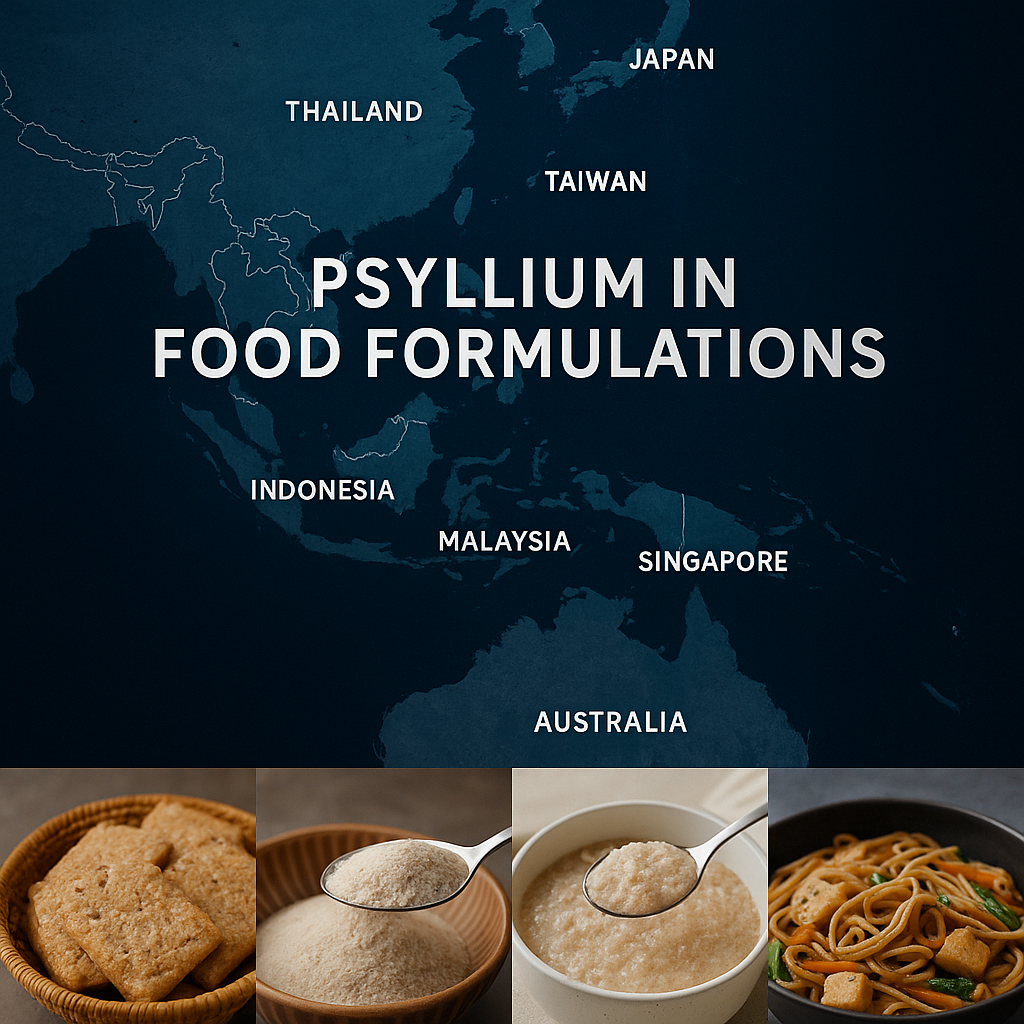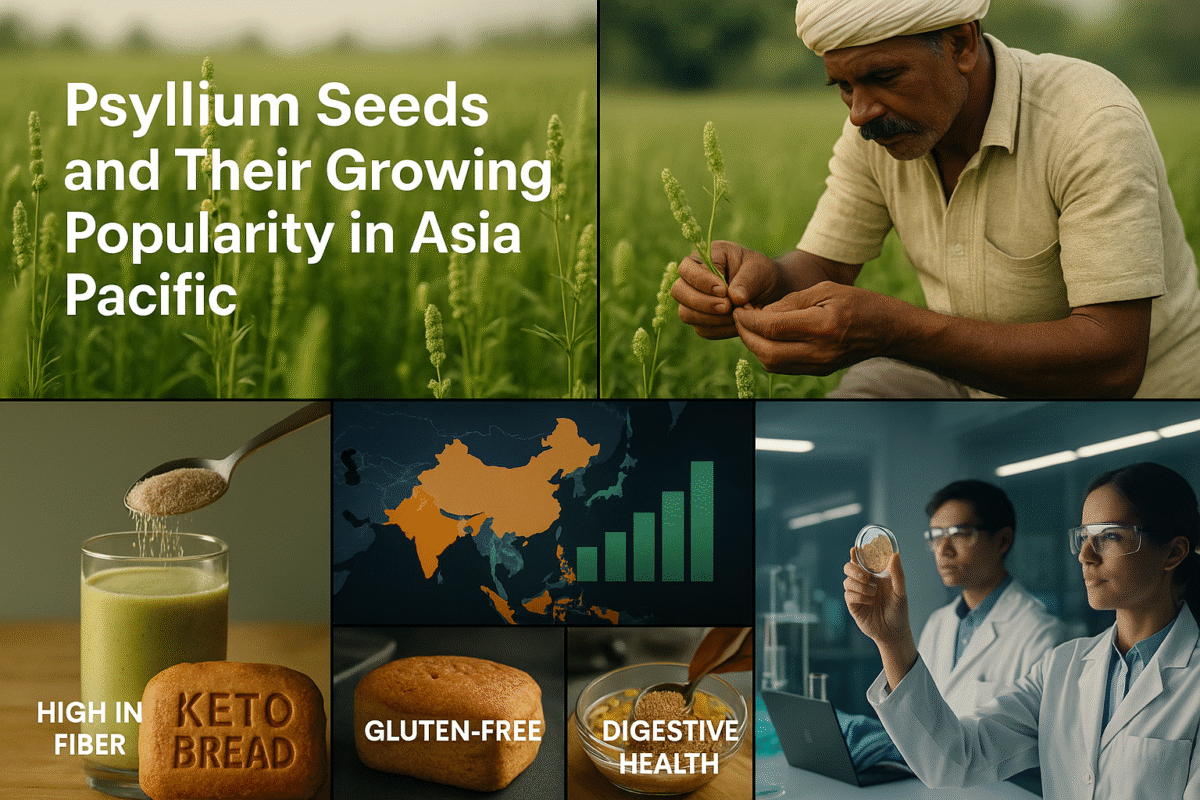Table of Contents
Psyllium seeds, derived from the Plantago ovata plant, have been used for centuries for their medicinal properties, particularly as a natural source of fiber. These tiny seeds are packed with soluble fiber, which makes them an ideal ingredient in modern food formulations, particularly for those following gluten-free and ketogenic (keto) diets. While psyllium has long been used in Western markets, its inclusion in food formulations has become increasingly popular in the Asia Pacific region. As the demand for gluten-free and keto products continues to grow, psyllium seeds have emerged as a key ingredient to support the health-conscious consumer base in countries like Australia, Thailand, Taiwan, Indonesia, Japan, South Korea, Malaysia, and Singapore.
Psyllium’s growing popularity in Asia Pacific can be attributed to its versatility and the rising awareness of gluten intolerance, celiac disease, and the health benefits of low-carb diets. In a region that has traditionally relied on rice and wheat as staple foods, the increasing adoption of gluten-free and keto diets is a notable shift. Psyllium seeds, with their high fiber content, provide a solution for improving the texture and nutritional profile of gluten-free and keto foods, making them suitable for a wide range of food products such as bread, noodles, cookies, and smoothies.
The diverse culinary traditions in Asia Pacific countries are also fueling interest in psyllium. Many cultures in the region embrace natural, plant-based ingredients that have been used for centuries. Psyllium, with its digestive health benefits and natural origins, fits well into this cultural context. Moreover, as more consumers seek out healthier food options, the role of psyllium seeds in gluten-free and keto food formulations is expected to expand even further.
Health Trends Driving the Demand for Gluten-Free and Keto Foods
In recent years, the Asia Pacific region has witnessed a surge in health-conscious consumers who are increasingly seeking alternatives to traditional food products due to rising concerns over gluten intolerance, celiac disease, and obesity. This shift has led to a growing demand for gluten-free and keto foods, both of which often require specialized ingredients like psyllium seeds.
The prevalence of gluten intolerance and celiac disease in the Asia Pacific region has prompted many to adopt gluten-free diets. While gluten-free foods were once considered niche products, they have now gained significant traction across countries like Australia, Japan, and South Korea, where a growing number of people are becoming more aware of the digestive issues linked to gluten consumption.

This demand for gluten-free alternatives is further supported by the increasing number of people diagnosed with celiac disease, an autoimmune disorder that prevents the body from properly digesting gluten, leading to a range of health issues.
At the same time, ketogenic diets, which are low in carbs and high in healthy fats, have exploded in popularity across Asia Pacific countries. The keto diet has become a favored choice among those looking to lose weight, manage diabetes, and improve overall health. The focus on low-carb, high-fat foods means that many traditional foods like bread, noodles, and rice are replaced with keto-friendly alternatives, which can often lack fiber. This is where psyllium seeds come in: they provide a plant-based, natural source of fiber, helping individuals maintain a healthy digestive system while adhering to the strict rules of the keto diet.
With both gluten-free and keto diets being popularized by health-conscious consumers, food manufacturers in Asia Pacific are increasingly turning to psyllium as a functional ingredient. As a natural fiber source, psyllium helps in improving digestive health, regulating bowel movements, and enhancing the texture of food products that otherwise might lack fiber. The growing demand for these diets is a key driver behind the increased use of psyllium in food formulations across the region.
The Role of Psyllium Seeds in Gluten-Free Food Formulations
One of the most significant challenges when creating gluten-free foods is replicating the texture, elasticity, and consistency of traditional gluten-containing products. Gluten, found in wheat and other grains, provides structure to baked goods, giving them their soft and chewy texture. In gluten-free foods, this structure is often lacking, resulting in products that are dry, crumbly, or dense. This is where psyllium seeds play a vital role.
Psyllium seeds, especially when ground into psyllium husk, have the unique ability to absorb water and form a gel-like substance. This property is particularly beneficial in gluten-free formulations, as it helps bind the ingredients together and retain moisture. The result is a product that has a better texture and is less likely to crumble or dry out. Psyllium also enhances the chewiness and mouthfeel of gluten-free products, making them more palatable to consumers.
In addition to improving texture, psyllium is a valuable source of soluble fiber, which is often lacking in gluten-free products. Many gluten-free foods rely on refined grains or starches that are low in fiber. By incorporating psyllium into gluten-free formulations, manufacturers can improve the nutritional profile of the product, making it a more complete source of nutrition for those on gluten-free diets. The fiber in psyllium also contributes to digestive health, helping to regulate bowel movements and prevent constipation, a common issue for those following gluten-free diets.
Examples of gluten-free products containing psyllium in the Asia Pacific region include bread, muffins, cookies, and crackers. In Australia, where the gluten-free market is booming, psyllium is often included in bakery goods to ensure they maintain their structure and texture. Similarly, in Japan and South Korea, where gluten-free diets are gaining popularity due to rising awareness of gluten sensitivities, psyllium is used to improve the texture and nutritional value of gluten-free noodles and rice alternatives.
The Role of Psyllium Seeds in Keto Food Formulations
The ketogenic diet, which focuses on high-fat, low-carbohydrate foods, requires special attention to nutritional balance, particularly in maintaining fiber intake. One of the key challenges for keto dieters is ensuring adequate fiber consumption, as many traditional high-fiber foods like whole grains, fruits, and starchy vegetables are restricted on this diet. Psyllium seeds, known for their high soluble fiber content, provide an ideal solution for keto formulations by increasing fiber intake without adding significant carbohydrates.
Psyllium’s role in keto food formulations is particularly important because it serves as a source of dietary fiber, which is often lacking in many keto-friendly products. Fiber is essential for maintaining healthy digestion, regulating blood sugar levels, and promoting overall gut health. Psyllium seeds provide a natural, plant-based way to supplement fiber in keto products without impacting the carb content. This makes psyllium an excellent choice for keto-friendly breads, smoothies, energy bars, and baked goods.
Additionally, psyllium seeds play a crucial role in the texture and consistency of keto food products. As psyllium absorbs water, it expands and forms a gel-like substance, which helps to improve the mouthfeel of keto foods. This is especially important in low-carb baking, where the lack of traditional flours and binders can lead to dry or crumbly textures. By incorporating psyllium into keto formulations, manufacturers are able to create products that are moist, chewy, and satisfyingly dense, mimicking the textures of traditional carb-heavy foods.
In Asia Pacific countries, where the keto diet has gained traction in recent years, food manufacturers are increasingly incorporating psyllium into keto products. In Australia, for example, the growing demand for keto-friendly bread and crackers has led to the inclusion of psyllium as a core ingredient. Similarly, in Japan and South Korea, where keto diets are becoming more popular due to health trends and concerns over obesity, psyllium is being used to enhance the fiber content of keto-friendly noodles, desserts, and baked goods.
Country-Specific Applications of Psyllium in Food Formulations
Australia
Australia has long been at the forefront of health-conscious food trends, and the demand for gluten-free and keto-friendly foods has been steadily rising. Psyllium’s role in both of these markets is significant, as it offers a natural, fiber-rich alternative to help improve the texture and nutritional profile of these foods. Australian consumers, who are increasingly seeking low-carb and gluten-free options, have driven the adoption of psyllium in various food products, including bread, pasta, crackers, and cookies. The popularity of gluten-free baked goods, combined with the rise of the keto diet, has created a perfect storm for the expansion of psyllium use in food formulations. Australian food manufacturers are utilizing psyllium not only for its fiber content but also for its ability to enhance the texture of gluten-free and keto products, ensuring they are moist, chewy, and have an appealing mouthfeel.
Thailand

In Thailand, where traditional rice-based diets are prevalent, the adoption of gluten-free and keto diets has been slower compared to other countries in the Asia Pacific region. However, as more consumers become aware of the benefits of low-carb and gluten-free lifestyles, the demand for these foods is growing. Psyllium has started to gain popularity as a key ingredient in Thai gluten-free and keto products, especially as people seek healthier alternatives to rice and noodles. Thai food manufacturers are incorporating psyllium into gluten-free rice noodles, low-carb desserts, and keto-friendly snacks to help improve texture and boost fiber content. Thai consumers, known for their preference for natural and plant-based ingredients, are increasingly turning to psyllium to support their digestive health while enjoying their favorite foods.
Taiwan
Indonesia
Japan
South Korea
Malaysia & Singapore
Regulatory Landscape and Market Dynamics in Asia Pacific
The regulatory framework governing the use of psyllium in food formulations varies across the Asia Pacific region. In Australia, the Food Standards Australia New Zealand (FSANZ) regulates the inclusion of psyllium in food products. Psyllium is classified as a food additive and is generally recognized as safe when used in appropriate amounts. In Japan and South Korea, the use of psyllium in food formulations is also regulated, with stringent food safety standards in place to ensure its safe consumption. In countries like Taiwan, Malaysia, and Singapore, food safety authorities monitor the inclusion of psyllium in food products, particularly when it is marketed for health benefits.
As the demand for gluten-free and keto foods continues to rise in the region, food manufacturers are navigating a complex regulatory landscape to ensure compliance with local food safety standards. With the increasing popularity of psyllium, it is expected that regulatory bodies in Asia Pacific will continue to adapt their policies to support the safe and effective use of this functional ingredient in food products.



